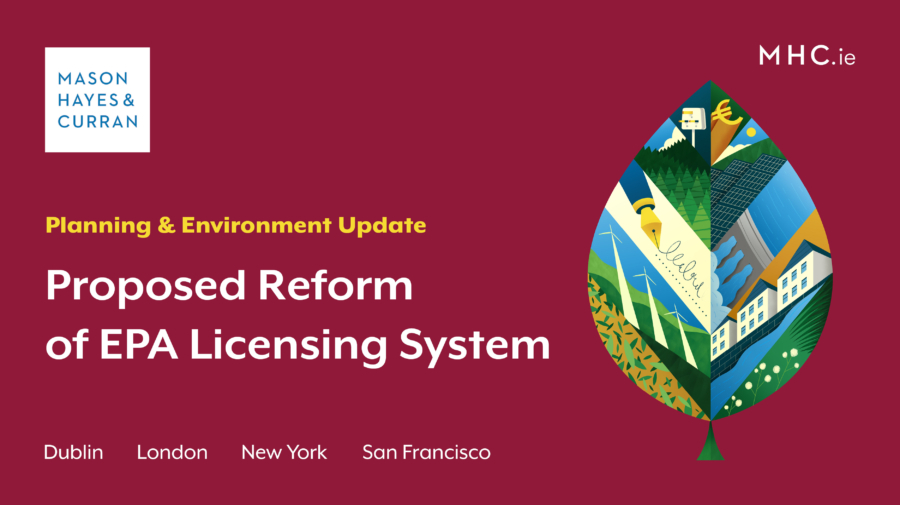
The Irish Government has approved the General Scheme of the Environment (Miscellaneous Provisions) Bill 2024. The Bill is intended to streamline the licensing system of the Environmental Protection Agency (EPA). It will provide definite timeframes for EPA licensing decisions. It will also provide the EPA with more options to efficiently regulate lower risk activities. Additionally, the EPA will be able to make minor changes to licences while at the same time ensuring that appropriate and proportionate environmental protections are in place.
The reformed system will complement the statutory timelines being introduced under the Planning and Development Bill 2023. The Bill is expected to be enacted later this year.
The General Scheme primarily proposes amendments to the Environmental Protection Agency Act 1992 (the 1992 Act) and the Waste Management Act 1996 (the 1996 Act). Some of the proposed changes include:
Application for exemption from EIA Directive
applicants for integrated pollution control (IPC) licences will be able to apply to the EPA for an exemption from the requirement to carry out an environmental impact assessment (EIA) of a proposed activity. The application for an exemption will have to be made before an IPC licence application is made. In considering an application for an exemption, the EPA will have to invite submissions from the relevant local authority and any other state affected by a transboundary activity. An exemption will only be permitted where the EPA is satisfied that:
- Exceptional circumstances warrant the granting of such an exemption
- The application of the EIA Directive would adversely affect the purpose of the proposed activity, and
- The objectives of the EIA Directive will be achieved by other means. This includes assessments carried out in compliance with other statutes
Examples of when the EIA Directive could adversely affect the purpose of a proposed activity include civil emergencies and for matters of national defence. The Bill will provide a statutory definition of ‘emergency applications’. This is intended to expand the provision in the Environmental Protection Agency (Emergency Electricity Generation) (Amendment) Act 2023 to cover alternative assessments for designated developments, in line with the EIA Directive.
If an exemption is granted, this may be subject to conditions. For example, the EPA may condition that the activity must be subject to some form of assessment other than an EIA. Notification of a grant of exemption must be published by the EPA and notified to the relevant authorities.
Whilst this proposal may be welcomed by prospective applicants for IPC licences, a caveat is that a licence application cannot be made while an application for an exemption is pending. This could potentially mean that, if a grant of exemption is judicially reviewed, the prospective applicant could be prevented from making the licence application for a lengthy period.
Review of licences
Under the current legislation, where an application is made to review an existing licence, the EPA’s practice is that it must carry out a full review of the licence in accordance with the Act. It is now proposed to empower the EPA to carry out a limited type review of a licence where the EPA determines that:
- An EIA is not required
- Consultation under the Industrial Emissions Directive is not required, and
- The proposed change to the licence does not constitute a substantial change
This provision will allow the EPA to limit its review of a licence to the changes proposed, provided these criteria are met.
Timelines for EPA decisions
Under proposed amendments to both the 1992 Act and the 1996 Act, the EPA will be obliged to decide licence applications within certain timeframes, as follows:
- Review of existing licence (16 weeks)
- Application for licence for an activity considered unlikely to have a significant effect on the environment (26 weeks), and
- Application for licence for an activity considered likely to have a significant effect on the environment (52 weeks)
Where the proposed activity does not require a grant of planning permission, the relevant time period commences on the date the application is made to the EPA. If planning permission is required, the relevant time period commences:
- On the date the planning permission has been granted, or
- When an appeal has been submitted, commencing from after the appeal decision has been made and time for judicial review has expired.
As with the Planning and Development Bill 2023, the intention here is to provide certainty in terms of timelines to developers regarding developments that require a licence.
Notification of EPA decisions
Under the current legislation, the EPA is required to notify certain persons of how it intends to decide a licence application before issuing its decision. For example, the EPA must notify the relevant planning authority and any persons who made a submission on a licence application.
The Bill provides that the Minister for the Environment, Climate and Communications may make an Order dispensing with this requirement in certain circumstances. These are:
- Where the activity is required by reason of an accident or emergency
- Where the activity has been granted planning permission or planning permission is not required as part of the licence application
- Where the EPA considers the activity is not likely to have significant effects on the environment, and
- Where the requirement to hold a consultation in accordance with the Industrial Emissions Directive[1] does not apply
The purpose of this approach is to prevent the EPA from being compelled to issue a proposed determination when planning permission has been granted or is not required. Additionally, it ensures that the EPA can decide whether an EIA is not necessary.
Binding rules
It is proposed to provide the EPA with powers to prescribe general binding rules for certain classes of activity. These rules will apply to any person that performs an activity requiring a licence under the 1992 Act. Where general binding rules apply, the person will not be required to seek a licence to perform the activity. Instead, they will be required to register specified details of the activity with the EPA and to meet the general binding rules set by the EPA.
Conclusion
The General Scheme for the Bill provides some very practical changes to the EPA’s licensing system. These changes are expected to simplify certain licence applications, and to remove the requirement to obtain a licence for certain types of lower risk activities. These changes will be welcomed by industry.
The General Scheme will be the basis of the Environment (Miscellaneous Provisions) Bill 2024. The Bill is expected to be brought to Government this year. It will then be published and introduced in the Oireachtas.
For more information on the proposals set out in the General Scheme of the Bill, contact a member of our Planning & Environment team.
People also ask
What is the Environment (Miscellaneous Provisions) Bill 2024? |
The Environment (Miscellaneous Provisions) Bill 2024 is a proposed piece of legislation. It is primarily intended to reform the decision-making process of the Irish Environmental Protection Agency. Areas of reform are expected to include the simplification of the licensing process for certain types of waste, industrial emissions, and integrated pollution control licences. It is also expected to remove the requirement to have a licence for certain types of lower risk activities, amongst other things. |
The content of this article is provided for information purposes only and does not constitute legal or other advice.
[1] Directive 2010/75/EU of the European Parliament and of the Council of 24 November 2010 on industrial emissions (integrated pollution prevention and control) (recast)





